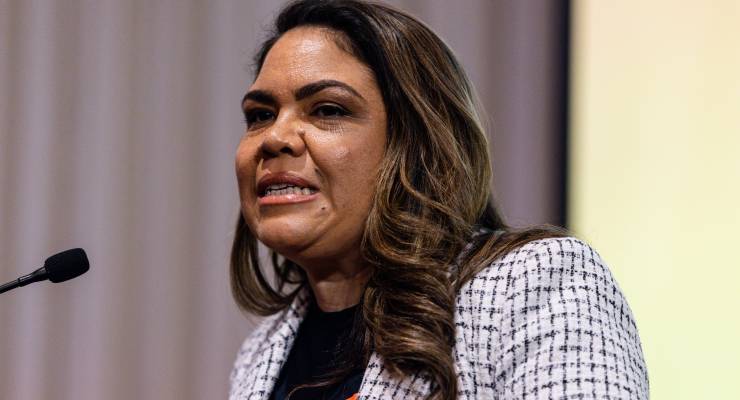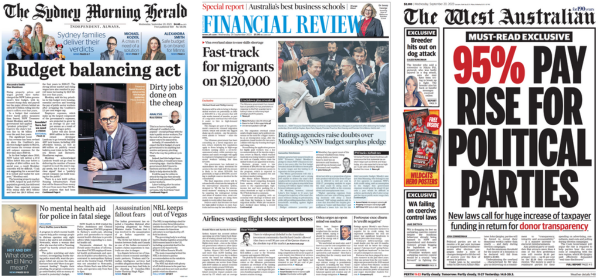
FLYING HIGH
Leading No campaigner Jacinta Nampijinpa Price, who has vowed to take on Canberra’s “elites”, has charged taxpayers $76,509.19 for 76 business-class flights since she was elected last May until June this year. The SMH ($) reports she spent $19,062 on hotels too — and sure, she’s allowed, and sure, she’s from the NT so it’s a long way to go. For comparison, however, the paper notes her predecessor, former senator Sam McMahon, spent just $18,000 on flights in her last nine months. It seems McMahon preferred away to home, however — her taxpayer-funded hotel bill was $74,635 for 186 nights over nine months before she was rolled to make way for Price, The Age ($) reported at the time. To another person racking up frequent flyer points: US ambassador Caroline Kennedy has flown home at least five times since she got the gig, Sky News Australia reports, reportedly raising eyebrows. But Sharri Markson didn’t quote a single person, just basically relayed that some people had told her the ambassador is hard to find, while others said she was wrangling anti-AUKUS pollies in the US. I guess we’ll take her word for it.
Back to the Voice a moment and Olympic champion Cathy Freeman has urged us to vote Yes in a video to support Australians “who need it most” because she “can’t remember a time when change has felt so urgent”. She joins fellow Yes supporters Celeste Barber, Cate Blanchett, Brooke Boney, Adam Goodes, Johnathan Thurston, Evonne Goolagong-Cawley and Ash Barty, news.com.au reports. Meanwhile, former Labor minister Gary Johns is still in leadership in two No campaign groups, Guardian Australia reports, despite saying some Indigenous people lived in a “stupor” and should “learn English” and despite Nyunggai Warren Mundine insinuating Johns would not be speaking publicly. It comes as Peter van Onselen wrote this week for The Australian ($) that not everyone voting No is racist, but every racist is voting No.
POWER SURGE
NSW households will get up to a $350 rebate for energy bills, news.com.au reports — specifically, the family energy rebate will increase from $180 to $250, the seniors energy rebate from $200 to $250, and the low-income household rebate and medical energy rebates from $285 to $350. Other winners are public sector employees (4.5% pay increase), teachers (starting salary will go from $75,791 to $85,000, experienced teachers will go from $113,042 to $122,100), first-home buyers (waived stamp duty for homes up to $800,000, a discount for those up to a mill). Eh, the SMH’s Alexandra Smith says — overall the budget was “safe and risk-averse” with “no cash splashes”.
Speaking of cash, WA Premier Roger Cook is introducing laws that’ll force political parties to reveal their donations weekly rather than yearly, The West ($) reports, and daily during elections. Wowza. He’ll also drop the donation declaration threshold from $2500 to $1000, and close a loophole that allowed WA parties to use the federal disclosure threshold of $16,300. The reforms will also see the $2.26 payment to parties that get more than 4% of the first preference vote nearly double to $4.40 for each primary vote — parties use that for advertising, consultants and other election costs. And in Victoria, the Andrews government will release its housing statement today, the Herald Sun ($) reports — it’s likely to have new restrictions on rent increases, a 7.5% tax on short-stay accommodation hosts such as Airbnb, and a plan to build 800,000 homes in a decade.
DUTTON’S DRONES DOWNED
The Albanese government has binned a $1.3 billion deal to buy drones used by China and Russia signed by then-defence minister Peter Dutton in the dying days of the Morrison era, the ABC reports. Defence wouldn’t confirm it, but the company did. The Austrian-made Schiebel S-100 CAMCOPTER has also been sold to Myanmar, human rights groups say, reportedly in violation of EU sanctions. Meanwhile Dutton’s bright idea about nuclear is not a commercial reality — the CSIRO says there are only two small nuclear reactors in the world — in Russia and China — and both were majorly delayed and majorly over budget, Guardian Australia reports. The paper adds that nuclear was banned under Liberal darling John Howard, and a whopping 40% of the electricity in the eastern states came from renewables in the past month, so…
Did you catch that 17-year-old baby-faced kid Will Shackel on Q+A on Monday night barracking for nuclear? He heads up a campaign group called Nuclear for Australia, which is calling for names for a petition to reinstate nuclear. Aww. Internet sleuths noticed something a little weird in his privacy policy, however — “As a registered political party, the Liberal Party of Australia is exempt from the Privacy Act 1988 (Commonwealth of Australia)…” It disappeared shortly after. Data harvesting or error? You be the judge. It comes as Infrastructure Minister Catherine King has asked the Australian Energy Market Operator to “engage thoroughly and honestly with impacted communities … from project conception, to construction and beyond” on the Victorian-NSW interconnector transmission project — it plugs renewables into the grid. Writing as the Ballarat MP, The Australian ($) reports King said she was “shocked and disappointed” by the disrespect shown to local communities who are worried about their land.
ON A LIGHTER NOTE
Pleasure, the happiest man on earth tells The Guardian’s Emma Beddington, is not happiness. Self-described as having “the profundity of a Pop-Tart”, the writer presses Buddhist monk Matthieu Ricard on the statement. Consider a hot shower, he says. It’s pleasurable after walking in the snow but not after 24 hours of lathering up. Bach sounds wonderful a few times, but even the most beautiful music can become monotonous on repeat. Pleasure fades when circumstances change, he says, while happiness gets deeper the more you experience it, “deeper, vaster, resistant to circumstances”. So how do we experience happiness like that, Beddington wonders? After all, she told a fruit fly to fuck off earlier that day. We must cultivate “benevolence, inner strength, inner freedom so you are not too fragile for the ups and downs, discernment”, Ricard responds.
Ricard is not really comfortable with the title “the happiest man on earth” — his PhD is in the much more frank molecular genetics — but in 1972 he left the scientific community to embrace Tibetan Buddhism, and then a 2004 university research project was blown away when they found he experienced unprecedented levels of wellness and focus while he mediated. Ricard is perhaps best known for his book Happiness, but he’s released several — the latest entitled Notebooks of a Wandering Monk. For the past few years, however, he quietly nursed his mother through her 100th — and final — year. Her death was “wonderful”, he recalled. “We surrounded her with love at home.” Now he plans to resume his wandering life, with a smile always hinting at the corners of his mouth. If there’s anything he hopes for us mere mortals, is that we each “become a better human being to better serve others”. So no swearing at bugs, okay?
Hoping you feel a sense of peace today.
SAY WHAT?
Alan Joyce has abandoned ship, he has headed to the emergency exit with $24 million under his wing. His management team is responsible for the largest sacking, illegal sacking, of Australian workers in corporate history. The people responsible for holding management to account are the board and the board has got to go.
Michael Kaine
The Transport Workers’ Union secretary says the new Qantas CEO, Vanessa Hudson, told him she would directly apologise to the 1,700 people axed during Joyce’s tenure, but it’s not enough. Kaine wants the entire board to resign in shame.
CRIKEY RECAP
“The unflinching truth is the right, or at least the far right, has always been opposed to policies and measures that seek to level the playing field between Indigenous and non-Indigenous people in any way. It offends its twisted worldview of the natural order of things, which has as its apex white supremacy in all its truculent power. The allure of replacement theory stems from its insistence that any realignment of this worldview in favour of Indigenous people is necessarily threatening and must be extinguished.
“The problem confronting the country today lies in the force of the right’s poisonous rhetoric, which — if left unchallenged — could become the dominant story of our times, where the referendum’s defeat is taken, as Professor Marcia Langton has suggested, as a mandate to roll back Indigenous investment. It’s no exaggeration, in other words, to suggest the referendum heralds a rendezvous with history.”
“Since then, Brand has shifted to the right and doubled down on the wellness schtick. In an elegant demonstration of horseshoe politics, he became an anti-vaxxer, peddled COVID misinformation and conspiracy theories about the favourite targets of the far right — Bill Gates, the World Economic Forum, ‘globalists’, Nancy Pelosi, the World Health Organization. Inevitably he’s a Trump supporter. That’s why he’s now a favourite of the very people who would have used allegations against him as evidence of the moral turpitude of the left a decade ago.
“As his earnest advocacy for ‘an egalitarian socialist society’ a decade ago, and his current enthusiasm for conspiracy theories, suggest, Brand is no deep thinker, but is as adept at switching ideologies as he is at switching media: his business model is YouTube and podcasts — among the vast far-right online ecosystem awash with content, Brand’s name and face recognition stand out enough to earn him a good income from YouTube ads.”
“The Indigenous No voices are beginning to crowd out the actual Yes voices, and it’s not News Corpse doing that. It’s the sheer volume of dissent to a proposal and a plan — demanding the minimum possible political change so that the right would support it, and excluding from the start those likely to dissent from it — that’s doing it. The Voice has come apart on the Indigenous side, and whites have rushed in to fill the void.
“In so doing, the high-profile Yes case, or the white side of it, has become a festival of political narcissism — and at the same time as a positive development: the rise of the Yes volunteer army. That tension was visible over the weekend as the Yes rallies surged across the country in a genuine outpouring of affirming energy, while Yes thought leaders upped the narcissism and fundamental misrecognition by the Yes case of the wavering or sceptical people whose votes they need.”
READ ALL ABOUT IT
India expels Canadian diplomat in tit-for-tat move as spat over assassinated Sikh activist deepens (CNN)
Six unforgettable UN General Assembly moments (Al Jazeera)
Georgia accuses Ukrainian official of plotting coup (euronews)
China’s former foreign minister ousted after alleged affair, senior officials told (The WSJ) ($)
Azerbaijani forces strike Armenian-controlled Karabakh, raising risk of new Caucasus war (Reuters)
Beijing demands Hong Kong consulates hand over local staff data (BBC)
Canada’s inflation rate increases to 4% (CBC)
THE COMMENTARIAT
NSW budget: Chris Minns gives Daniel Andrews a lesson on budgets — Simon Benson (The Australian) ($): “There are now two different political and fiscal models on display from two different Labor state governments facing very similar problems — a housing crisis, an economy in retreat and union pressure to dramatically boost public sector wages. Neophyte NSW Treasurer Daniel Mookhey has made an attempt to demonstrate at least some fiscal discipline in his first budget. The lack of it from Victorian Treasurer Tim Pallas’s punitive tax model was a key criticism of the Andrews government model. Not that you’d call the Minns government efforts on Tuesday overly courageous. And its usefulness is predicated on a lot going right in the economy. In other words, that the outlook doesn’t get worse. There isn’t a lot of wriggle room.
“And while Mookhey gives the appearance of a treasurer trying to make some hard decisions to get the budget back into the black and start arresting the debt peak, there will be critics that suggest it was modest at best. The comparison he will be keen to have made is that unlike his counterpart in Pallas, he has done it without overly defaulting to tax hikes — if you discount the lift in coal royalties. (Where Victoria found only $2 billion in savings, NSW managed to find $13 billion.) Why does this matter? While state budgets were once largely unimportant at a national level, COVID changed the equation. The combined debt of the provincial governments is rapidly approaching that of the Commonwealth’s and the spending profiles have been all pointing in the wrong direction. Community expectations on cost-of-living relief from their provincial governments cannot be discounted collectively from the broader inflation problem — which is blind to the source of money being pumped into the economy.”
Controlling the political narrative is key to winning the NZ election — no easy task for Chris Hipkins — Suze Wilson (The Conversation): “Attempts to analyse leadership often focus on personal attributes — such as skills, personality, character and decision-making — and how these influence the results a leader achieves. But what leadership researchers call ‘followership’ — in this case, voter attitudes, behaviours and expectations — matters greatly. So does the wider socioeconomic and cultural context in which a leader is operating. Weighing all these can help reveal how Hipkins is responding and performing as a political leader. In a nutshell, his core challenge is to navigate adverse conditions in ways that rise above the mere theatrics of politics. He needs to connect with voters’ values and interests, not just their current mood.
“If Hipkins can do that, and with at least one recent poll suggesting the election could deliver a hung parliament, he could secure Labour a chance of forming the next government. Hipkins is campaigning primarily on his and Labour’s claimed desire and ability to support the ‘ordinary Kiwi’ — that traditional target of most political parties. His own background as the ‘boy from the Hutt’, along with his self-deprecating and pragmatic, centrist instincts, are important features of his appeal and credibility. That pragmatism orients him to seek politically practical and achievable outcomes whatever the circumstances. The challenge, however, is to be both aspirational and positive while also not indulging unrealistic expectations. Research shows people are more likely to trust and support leaders they see as being ‘one of us’, and who they believe are genuinely motivated to act ‘for us’.”
HOLD THE FRONT PAGE

WHAT’S ON TODAY
Eora Nation Country (also known as Sydney)
-
NSW Treasurer Daniel Mookhey will talk about the state budget at The Fullerton Hotel.









Instead of increasing rebates on power prices, why not block power price increases?
The rebate is, in effect, subsidising the power companies.
The murder in Canada of the Sikh activist – who does the Modi government think they are? Israel? Saudi Arabia? …. Uncle Sam?
But it is nice to see Albanese sticking up for his newest bestest little mate, trying to move the press on, from asking those sort of questions…
“Princess Pricey”?
And damn those “elites”?
… I’ve always wondered what it would be like to fly first class, or get those tax-payer funded allowances like they do, for what they do …..
Yes, funny how we only hear about the elites promoting the YES case.
However, in this case, I think the analogy related to snouts in troughs is also apt. There may well be Federal pollies on the YES side also billing the taxpayers for their referendum-related travel. Just not so hypocritical about it.
As for flying Business Class, so far as Qantas is concerned (at least), the general response these days seems to be that it ain’t what it used to be.
The Yes/No campaigns aren’t supposed to use taxpayer money to promote their causes, other than AEC information like the brochures. But I guess JNP as a senator, gets to fly just about anywhere in the country she wants to. With whatever excuse she needs.
Like Julie Bishop doing her ‘migraTory swan’ around the country to watch her WC Eagles – ‘organising’ ‘official business’ in those venues?
First class? That’s a different thing. The report says Price flies Business class, which is considerably cheaper and less luxurious than First (so I am told, never experienced either). So that’s all right.
Raises the question – how many business class flights can you take before you qualify as one of the “elite”? – Platinum Frequent Flyer status can’t be far off.
And it’s ‘funny’ how the ABC Q&A researchers/producers missed that little detail on Shackel’s c.v?
… So they had Ted ‘Elmo’ O’Brien (‘Scott Morrison’s older brother’? … The ‘familial’ resemblance?) and Shackel on the one ‘anti-solar(?)’ panel?
Simon Benson-McKenzie, pushing out another “Dictator Dan” Munch knock-off?